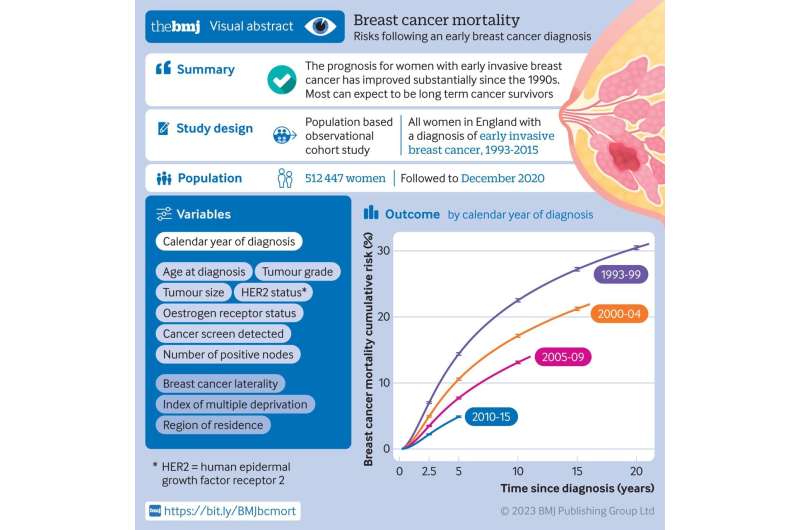This article has been reviewed according to Science X's editorial process and policies. Editors have highlighted the following attributes while ensuring the content's credibility:
fact-checked
peer-reviewed publication
trusted source
proofread
Most women diagnosed with early breast cancer can expect to become long-term survivors, say experts

Most women diagnosed with early stage breast cancer today can expect to become long-term cancer survivors, finds a study published by The BMJ today.
The findings show that the average risk of dying from breast cancer in the five years after a diagnosis has fallen from 14% to 5% since the 1990s. For those diagnosed during 2010-15, more than six in 10 women had a five-year risk of 3% or less.
The researchers say their findings can be used to reassure most women treated for early breast cancer that they are likely to become long-term cancer survivors. The findings can also help identify those for whom the risk of dying from breast cancer remains substantial.
Worldwide, more than 2 million women receive a diagnosis of early breast cancer each year. While the risk of dying from breast cancer in these women has decreased over the past few decades, the extent of this decrease was previously unknown. Also, it was not known whether this decrease applied to groups of women with certain characteristics or whether it applied to all groups.
To address this uncertainty, researchers used data from the National Cancer Registration and Analysis Service to investigate the long-term risks of dying from breast cancer after a diagnosis of early breast cancer.
They included all 512,447 women registered in England with early breast cancer (i.e. cancer confined to the breast and possibly the axillary lymph nodes) as their first cancer from January 1993 to December 2015, and who were treated initially with surgery.
Annual breast cancer death rates and cumulative five-year risks were estimated, taking account of time since diagnosis, calendar period of diagnosis, and characteristics such as age, whether the cancer was detected by screening, involvement of lymph nodes, and tumor size and grade. All women were followed until December 2020.
The results show that for women with a diagnosis made within each of the calendar periods 1993-99, 2000-04, 2005-09, and 2010-15, the annual breast cancer mortality rate was highest during the five years after diagnosis and then declined.
Cumulative five-year breast cancer mortality risk was on average 14.4% for women with a diagnosis made during 1993-99 but only 4.9% for women with a diagnosis made during 2010-15.
Considering just the 156,338 women with a diagnosis during 2010-15, cumulative five-year breast cancer mortality risk varied substantially between women with different characteristics. It varied according to patient age, whether the cancer was detected by screening, whether it had certain receptors, and according to cancer size, grade and the number of lymph nodes involved. It was less than 3% for 62.8% of women, but more than 20% for 4.6% of women.
The researchers acknowledge that these observational findings can't determine the specific causes of these reductions in mortality and point to several other limitations. For example, data on cancer recurrence were not available. The study focused on women who were initially treated with surgery. It did not include women who received treatment to reduce the size of their cancer before surgery, women whose cancer had already spread, or women diagnosed with more than one cancer.
However, this study provides a detailed and accurate picture of breast cancer mortality in a complete population of women with early breast cancer for up to 20 years.
As such, they say these analyses "provide patients with early breast cancer, and the clinicians who treat them, with estimates of their likely prognosis based on up-to-date data."
They add, "Our study is good news for the great majority of women diagnosed with early breast cancer today because their prognosis has improved so much. Most of them can expect to become long-term cancer survivors."
More information: Carolyn Taylor et al, Breast cancer mortality in 500 000 women with early invasive breast cancer in England, 1993-2015: population based observational cohort study, BMJ (2023). DOI: 10.1136/bmj-2022-074684




















